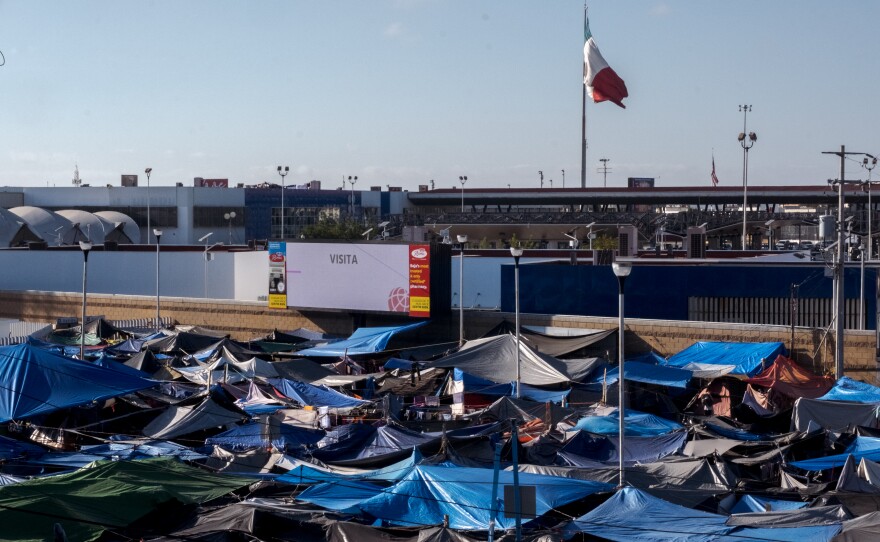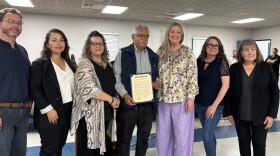Vaccinated tourists can now cross the border. But vaccinated asylum seekers still can’t because of a controversial Trump-era public health order that President Joe Biden has kept in place.
In Tijuana, hundreds of would-be asylum seekers with nowhere else to go created a makeshift camp just south of the San Ysidro border crossing.
Those migrants view the decision to reopen borders to nonessential travelers but not asylum seekers as a blatant double standard. Lawyers and advocates who work with them agree.
“What is more essential than trying to save your own life?” said Gina Garibo, a social worker with American Friends Service Committee who works with asylum seekers stranded in Mexico.
The order, called Title 42, allows border officials to turn away any foreign national attempting to enter the United States without proper documentation. Previously, asylum seekers who presented themselves at the border and established credible fear for their safety if they returned home were allowed to begin their asylum cases in a U.S. court.
Title 42 leaves people with few legal options to enter the country and request asylum.
“This is effectively the most sweeping ban on asylum at the border in U.S. history,” said Julia Neusner, a lawyer with Human Rights First.
The Trump administration implemented the order in March 2020, saying it was necessary to stop the spread of COVID-19.

Immigrant rights advocates and other critics have said the order was an example of former President Donald Trump using the pandemic to further his anti-immigration agenda. During the 2020 campaign, Biden largely denounced Trump's harsh immigration policy. Yet, since taking office the administration has kept it in place and even defended Title 42 in federal court filings this year.
In October, more than 1,300 medical professionals sent a joint letter to the Centers for Disease Control and Prevention urging the agency to stop Title 42. Physicians who signed the letter said the policy is based on, “junk science with no grounding in evidence and flies in the face of public health.”
Critics are now saying the justification for the order is on even shakier ground given that the administration has opened the border to vaccinated travelers.
“The fact that now vaccinated tourists and shoppers are allowed to enter but vaccinated people who are fleeing violence and are in urgent danger are not, is further evidence that this policy has never been about public health,” Neusner said.
Scott Pauley, press officer for the CDC, referred KPBS' questions about Title 42 to the White House. The White House did not respond.
'Very ugly' situation
Tijuana's makeshift migrant camp is a sprawling tent city. People sleep in tent on top of concrete floors. They shower outside under an overpass. Some people set up small businesses like barbershops and convenience stores. Children run around playing, some parents work during the day, and the rest simply wait.

Asylum seekers, particularly those fleeing cartel violence in Mexican states like Michoacán and Guerrero, fear that their attackers will find them in Tijuana. Asylum seekers avoid venturing into the heart of Tijuana and stay as close to the border as possible to ensure they are among the first to be let across when Title 42 is lifted.
A woman, whose identity we are protecting, fled from Michoacán after cartel members killed two of her brothers and kidnapped her oldest son in February. She has received threatening messages from her son’s kidnappers telling her that they know she is in Tijuana.
The middle-aged woman, who we are calling Carmen, has been living in the makeshift camp with her common-law husband and two younger children since April.
The family arrived with almost no money. During their first month in Tijuana, they lived off beans, cheese and tortillas heated up in a microwave. Carmen said her children constantly complained of eating the same thing every day and have lost weight. It wasn’t until her husband got a construction job that the family bought a hot plate and began cooking other things.
“Being in this situation is very ugly,” she said in Spanish. “I don’t want to be here. I don’t want this for my children. But if I go back the cartel will kill me.”

Garibo, the social worker from American Friends Services Committee, has been hearing similar sentiments from the migrants all week.
“They were left with the feeling that they’re being ignored, that the administration doesn’t care about them,” she said.
Neusner, the Human Rights First lawyer, was peppered with questions during a recent visit to Tijuana.
“A lot of what I heard at the tent encampment last week was, 'Can you just tell me information about the process? What do I need to sign up? Is there a list that I can get on to? Can I get a number? how can I start the process?'” Neusner said.
“And I just had to tell people that there is no process right now,” she added.

Human toll
Human Rights First has been publishing monthly reports on the impact of Title 42.
Its October report claims 7,600 people have been kidnapped or assaulted in Mexico after being turned away via Title 42 since the start of the Biden administration.
The report provided gruesome details of the alleged crimes. They include:
- A young Honduran woman who was kidnapped and trafficked for sexual exploitation for months immediately after DHS expelled her to Mexico.
- A Haitian couple blocked from requesting U.S. asylum whom Mexican police have repeatedly robbed, extorted, and threatened with deportation.
- A Salvadoran family who was kidnapped and held captive in a locked storage room for 20 days immediately after DHS expelled them to Mexico.
Critics point out that many of the border states that migrants are sent back to appear on the U.S. State Department’s “Do Not Travel” advisory.
The Mexican state of Tamaulipas, which borders Texas, has a level four advisory “due to crime and kidnapping.” Baja California has a level three, “reconsider travel” advisory also due to crime and kidnapping.
In some cases, criminals know exactly where along the border migrants turned away via Title 42 will emerge. That makes them sitting ducks, Neusner said.
“The abuses that are happening at the border because of this policy are horrifying,” she said. “And organized criminal groups who control the borderlands in Mexico know that people seeking asylum are stranded along the border and the U.S. is returning people. And they pray upon this very vulnerable group of migrants.”
For individual asylum seekers who already faced trauma before arriving at the borderlands, this prolonged stay in limbo is causing mental health problems.
Garibo said she has seen many cases of stress, anxiety, depression, and even suicidal thoughts during her regular check-ins.
“There is a lot of desperation and uncertainty,” she said.
Despite all of this, Carmen doesn’t plan to go anywhere.
“We are going to keep on waiting here,” she said. “I have a lot of faith in the United States. The rule of law exists there. They will defend us because here, the authorities do not help us.”







